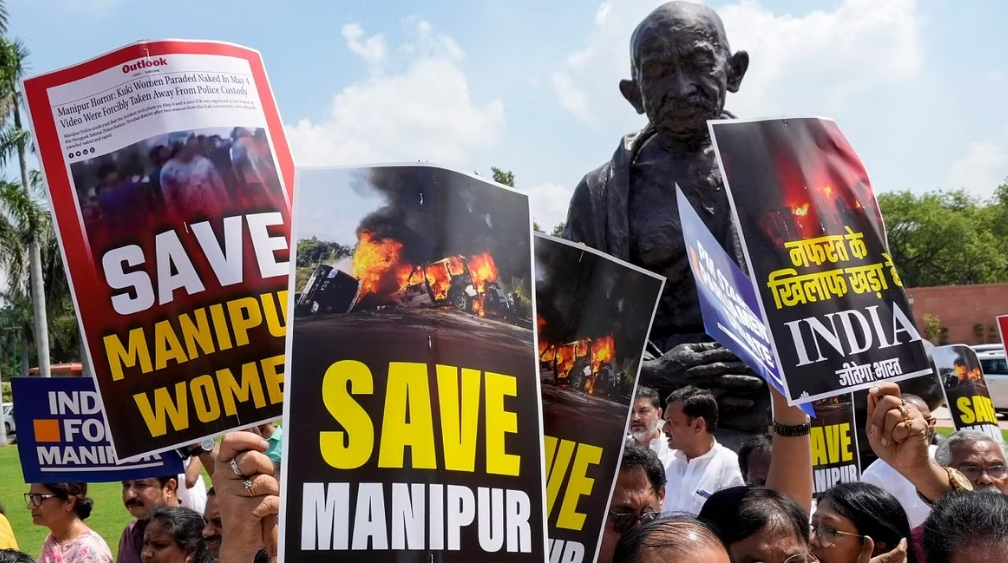Manipur’s Ongoing Crisis: Key Challenges Hindering Peace
Social Issues Social Inequalities and exclusionPosted by NewAdmin on 2025-01-31 05:42:53 |
Share: Facebook | Twitter | Whatsapp | Linkedin Visits: 48

Manipur has been grappling with violent ethnic clashes since early May, with tensions between the Kuki tribal group and the ethnic majority Meiteis showing little sign of resolution. The conflict, rooted in economic benefits and reservations, has escalated due to deep-seated mistrust and political complexities.
A peace committee formed by the Ministry of Home Affairs, led by Manipur Governor Anusuiya Uikey, has failed to gain traction as key civil society groups from both the Kuki and Meitei communities have chosen not to participate. The reluctance of influential stakeholders to engage in dialogue has made conflict resolution more difficult.
Attempts at backdoor negotiations between Kuki rebel groups under the Suspension of Operations agreement and Meitei civil society continue, but rebuilding trust through these discussions is proving to be a slow and arduous process. Without a foundation of mutual confidence, meaningful dialogue remains elusive.
The Manipur government and the Meitei community remain firm in their stance against any compromise on the state’s territorial integrity. On the other hand, the Kuki community argues that political power is concentrated among the Meiteis, who hold 40 of the 60 assembly seats, and thus they demand a "separate administration" for Kukis.
Security concerns have further exacerbated tensions, with both communities expressing distrust toward law enforcement agencies. Kukis perceive the Manipur police as biased, while Meiteis are skeptical of the Assam Rifles. The central forces currently deployed in the state cannot remain indefinitely, making it crucial for local law enforcement to restore order while the Assam Rifles focus on border security with Myanmar.
Political mediation has also faced challenges. The BJP’s efforts to utilize Assam Chief Minister Himanta Biswa Sarma as a key negotiator have been undermined. Despite his engagement with both sides after Union Home Minister Amit Shah’s visit, the resurfacing of a 2017 letter alleging secret agreements with Kuki ceasefire groups has led to Meitei distrust.
Demands for the removal of Manipur Chief Minister Biren Singh have further complicated peace efforts. The Kukis refuse to negotiate while he remains in power, whereas a significant section of Meiteis continues to support his leadership. This political deadlock has stalled any potential resolution.
The Nagas, Manipur’s largest tribal group, have remained largely neutral in the conflict. Although their political party, the Naga People’s Front, supports Biren Singh, they have prioritized their own ongoing peace talks with the central government rather than intervening in the Kuki-Meitei crisis.
Adding to the complexity is the involvement of Mizoram. The Mizo tribe shares strong ethnic ties with the Kuki, Zo, and Chin communities, and Mizoram has been sheltering displaced people from Myanmar and Manipur. This has caused friction with both New Delhi and the Manipur government, further straining inter-state relations.
The partial withdrawal of the Armed Forces Special Powers Act (AFSPA) in key areas of Manipur has also created logistical hurdles for large-scale military operations. Unlike in previous conflicts, authorities face legal constraints in deploying the army for full-fledged intervention, limiting their ability to restore stability.
With these overlapping challenges, the crisis in Manipur remains a complex issue requiring careful negotiation, political will, and a concerted effort to rebuild trust among the affected communities.
Search
Categories
Recent News
- Kannauj's Aromatic Journey to Europe: A Historic Trade Deal
- Chelsea's Cup Dreams Shattered: Fofana's Emotional Exit
- Kante's Turkish Twist: Fenerbahce Seal the Deal
- Kerala Defies Central Advice on Rice Incentives
- Naked Chaos at Bangalore's Elite Club: A Shocking Incident
- Solar Fury: ISRO's Vigil Against Radio Blackout
- Indian Markets: AI Jitters Halt Rally, IT Stocks Take a Hit
- SEBI's Reformative Push for Market Integrity
Popular News
- Navigating IPO Market Dynamics Amid Volatility and Regulatory Changes
- Massive Worldwide Microsoft Outage Disrupts Multiple Sectors
- Panjapur Bus Stand to Reshape TNSTC Routes
- తెలుగుదేశం పార్టీ - పేదరికాన్ని నిర్మూలించడంలో వాగ్దానం
- Universities Embrace Remote Learning Technologies Amidst Ongoing Pandemic